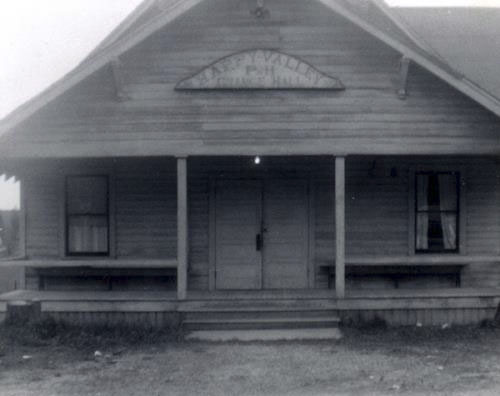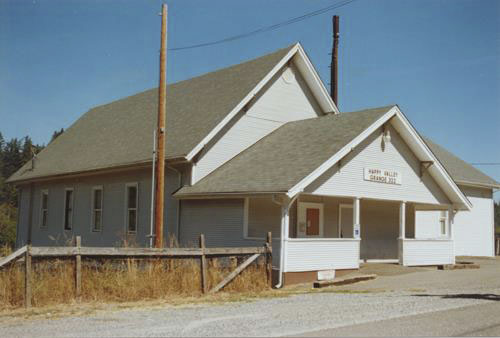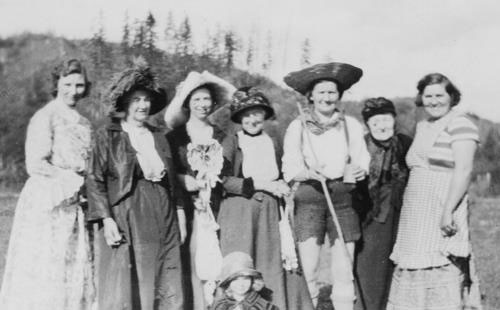
How many of us have driven by the small sign "Happy Valley Grange, next left (or right)" that's on both sides of the Redmond-Fall City Road at 196th Avenue Northeast with little thought other than just a casual glance at the sign? You might be surprised to learn that the Happy Valley Grange has a long and significant local history stretching back almost 100 years.
Many of us don't know the history behind local granges or the important role they have played in community society in the past. The national grange started in 1867, literally on the US capitol grounds in Washington, DC. From there the granges extended into the states, counties and then to the small communities of what was then primarily a rural America. The purpose of the granges was to bring people together to improve working and living conditions and allow the members to become self-sufficient, and to provide a social outlet for its members.
The first organizational meeting of the Washington State Grange was held in 1889 in LaCamas (near Vancouver, Washington). Soon after, the first Washington Grange number was assigned to Waitsburg Grange #1 near Walla Walla. There were other reasons in addition to the ones I mentioned above for the formation of the Washington State Grange. The Washington State Grange first organized in 1889, which is also the same year that Washington became a state. Many of the farmers and rural people here were alarmed at certain provisions that had been excluded from or written into the first proposal for the state constitution. This group wanted to organize to make sure that farmers and rural interests also had a voice in our state's government.
In 1909, two men came to Happy Valley, an area loosely defined as being along the Redmond-Fall City Road from about 196th Avenue Northeast to about 244th Avenue Northeast-- with the specific purpose of starting a grange. The first man was Ernest M. Smith, lecturer (a person in charge of educational, recreational and inspirational aspects of the grange) of the Washington State Grange. The second man was Mr. Sims (his first name is apparently lost to history) from the Bothell Grange. These men were seeking to set up a local grange in Happy Valley to work as a group to improve conditions in what was then a very rural community. The two men went house to house canvassing residents, and found twenty people in their initial canvass who were interested in starting a grange in Happy Valley.
The Happy Valley Grange held its first organizational meeting on September 2, 1909 at the Happy Valley School House, which was located on property next to what is now the Happy Valley Grange Hall. The Hall is currently located on NE 50th Street, east of 196th Avenue Northeast. There were 51 charter members, which had to have represented a significant percentage of the population of little Happy Valley and the surrounding area at that time. If you look at the roster of charter members, you'll see that many of the last names are Scandinavian – a testament to the early 20th century heritage of this particular area. You'll also see that more than a few of the charter members were members of the same family. The Grange took the official name of "Happy Valley Grange # 322", and quickly got down to work. Meetings were held twice a month; since there was no electricity in Happy Valley yet, the meetings were held by either daylight or kerosene light. Quarterly dues were 30 cents per member. Though the grange membership was for adults 14 years and older, most granges also had a "junior grange" for children ages 5 to 14. Happy Valley's Junior Grange organized in 1921.
The Grange's philosophy can best be summed up by the "Happy Valley Grange Creed" written in 1909 by one of its charter members, John Bossard:
We believe in the farm, the only sphere of activity in which man is in direct co-operation with nature;
We believe that work is a privilege, kindness a duty, and worry a crime;
We believe that the best crop the farm can produce is the boys and girls born and raised in healthful environment and that the best we can do for them is to teach them to love the farm.
The Happy Valley Grange grew rapidly during its early years, and in 1910 the lot for the present grange hall was purchased. The lot was heavily wooded, and was cleared by grange men and their horses. To raise funds to build the grange hall, the grangers solicited funds from its members, but also held socials, dances, and had a large entertainment night which was quite popular. The grangers built a small hall, but membership increased so rapidly during the 1910s that around 1920 it became necessary to enlarge the hall to its present size.
One of the first things the Happy Valley Grange did after it got started in 1909 was to write a petition to King County requesting the County build waiting rooms at the ferry docks on Lake Washington both in Kirkland and Madison Park in Seattle. (Ferries were the only way to cross the lake at that time-- the first bridge across Lake Washington would not be built until 1940, but ferries continued to operate on the lake until 1950.) Copies of the petition were sent to all of the Eastside granges asking for their support. (Most communities on the Eastside had granges– at one time there were 23 granges in King County alone. A few granges in our area included Issaquah Valley, Snoqualmie Valley Grange near Carnation–later it moved closer to Fall City-- and the Midway Grange in Bellevue.) Once the Eastside granges responded, the petition was submitted to the County in October 1909; by December, the ferry waiting rooms were under construction.
A few other early causes the Happy Valley Grange supported as it grew during the 1910s included rural free delivery of mail, and parcel post delivery. The Grange also supported women's suffrage–and women won the right to vote in our state in 1910, ten years before the 19th Amendment to the US Constitution guaranteed the same right to all women in America. Later in the 1910s the Grange promoted the bond issue for the Lake Washington Ship Canal, and during the First World War at the end of that decade local grangers did Red Cross work. In the 1920s the grangers were active on the "Good Roads Committee" in Redmond. "Good Roads" was a widespread campaign during the 1920s to build highways and wider roads for automobiles to replace the dirt tracks that had been used just a few years earlier by the horse and buggy. During the '20s and into the '30s the Grange also worked to bring electricity into the Happy Valley Community.
One of the Grange's signature accomplishments came in the 1930s. The Grange teamed up with the state Grange and helped get legislation passed which established the blanket primary in Washington State. The blanket primary gave Washingtonians the freedom to vote in the primary elections for any candidate of any party. Before this legislation passed, voters here in the primary elections were restricted to voting only for candidates who had the same party affiliation as the voter did. The legislation was passed in 1935; ironically, the Ninth US Circuit Court of Appeals struck down this law 68 years later, literally as I was putting the finishing touches on this article. As I write this we don't know yet if there will be an appeal of the Ninth Circuit decision, but history will tell.
The Happy Valley Grange continued to be a active force in the community in the years after the end of the Second World War in 1945. In the 1960s, the Grange started the petition for traffic signals in Redmond. Many local grange members also helped organize the Group Health Cooperative. Most recently, the Grange drafted a resolution to support dredging area rivers to improve salmon spawning and also improve flood control in flood-prone areas (think Snoqualmie Valley near North Bend in November.) This resolution has since been forwarded to the state grange in Olympia for presentation at the next legislative session in 2004. The Grange is also presently working with other area granges on a five year community service project to furnish dictionaries for 5th grade students in local schools.
The Grange has championed many causes over time. True to its farming roots, though, much of the focus of its work has been directed at agricultural issues that has a particular impact on rural communities. Just a couple of examples include the Grange's support in passing a state law for pure feed for livestock and its support of the cooperative movement for selling and buying farm supplies and produce.

The Happy Valley Grange has also provided a wide range of services to our area community for decades. Many of you have heard of Grange Insurance. One of the Happy Valley Grange members ran the Grange Insurance office (providing both life insurance and property and casualty insurance) in Redmond for nearly 30 years between the 1950s and 1980s. There was also a grange store in Redmond for many years which sold groceries and livestock feed.
There has been an important social side to the Grange as well. The Grange was an active participant in dozens of local community events, fairs, and parades for much of the 20th century. However, it was the also the center of most social events in Happy Valley in its early years, and the Grange continued into the 1970s to have social events. Square dancing socials were popular for years. But probably the most popular event was an annual "all you can eat" crab dinner. This grew to the point where one year over 800 pounds of crab (in the shell) was served.
The Grange continues to be active today in supporting the community, whether it's by making contributions to families who have just been burned out of their homes, having fund raisers, donating to local charities and food banks, or by supporting the Pacific Legal Foundation–a group of attorneys that works to protect private property rights. The Grange Hall has been regularly maintained and updated over the years, and is currently used not only for grange business but also as a polling place and by other groups who rent the hall for a specific purpose, like a wedding reception or a family birthday party.
If you look, you might be surprised how many times you'll still see the
grange name turning up in our world. Though membership has tapered off in
the Happy Valley Grange over the past 25 years or so (from a high of over
300 in the 1970s to 286 in 2000), the Grange remains an active force in our
community and continues to make a difference in our lives. As one grange
member who I spoke with told me: "Our grange motto is 'The Greatest Good
to the Greatest Number', and we try to follow that credo."
---Phil Dougherty

The Happy Valley Women Club was started about 1912; originally they were formed to make items for the service men. They met once a month for lunch.